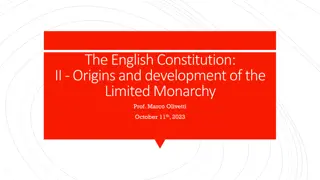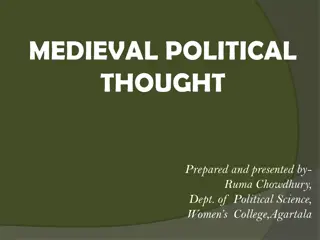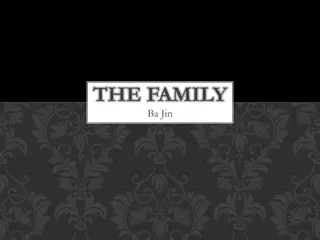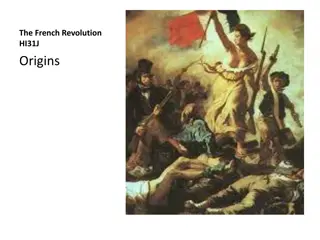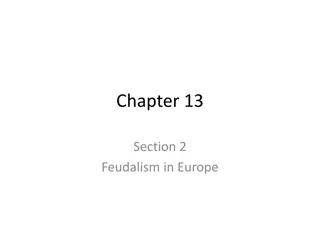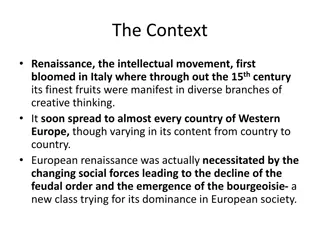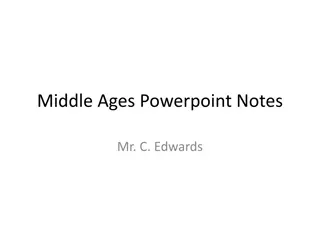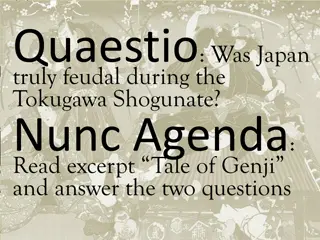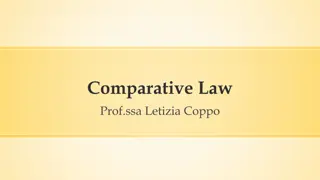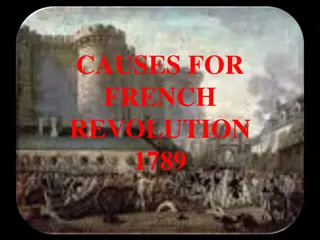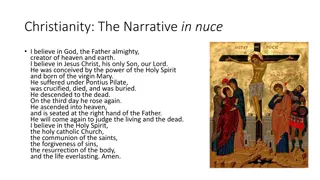Evolution of Limited Monarchy in English Constitution
The development of limited monarchy in the English Constitution is traced from Anglo-Saxon Britain through the introduction of feudalism. This system of governance established a complex relationship between the king, lords, and vassals, leading to the formation of the King's Council and the origins
0 views • 19 slides
Medieval Political Thought: Key Thinkers and Concepts
Explore the medieval political thought highlighting prominent thinkers like St. Augustine, St. Thomas Aquinas, and Marsilius of Padua. The period was characterized by universalism, the absence of organized states, and a blend of politics, economics, and religion. Discover the parallelism between Pla
3 views • 6 slides
The Family by Ba Jin: A Tale of Struggle and Revolution in 20th Century China
The Family by Ba Jin delves into the lives of the Kao brothers, highlighting their resistance against oppressive feudal authority in early 20th century China. The story follows the struggles of Kao Chueh-hsin, Kao Chueh-min, and Kao Chueh-hui as they navigate societal expectations and personal desir
0 views • 8 slides
Enlightenment Philosophers and Their Influence on the French Revolution
The French Revolution was influenced by Enlightenment philosophers like Thomas Hobbes, Rousseau, Voltaire, and Montesquieu. Their ideas on social contracts, collective sovereignty, enlightened absolutism, and the need for checks and balances challenged the traditional Ancien Régime's feudalism, pri
0 views • 26 slides
Japanese Feudalism Under the Shoguns: A Historical Overview
The period of feudalism in Japan from the 12th to the 19th century under the Shoguns is explored in this reading activity. It delves into the social structure, roles of different classes like daimyo, samurai, artisans, and merchants, as well as the power dynamics between the Emperor and the shogun.
1 views • 14 slides
European Medieval Society and the Clash of Christianity and Islam
Explore the historical context of European medieval society, focusing on feudalism, the Crusades, and the clash between Christianity and Islam. Discover how these events shaped the emergence of European civilization and led to significant cultural and religious transformations during the medieval pe
0 views • 9 slides
Feudalism in Europe: New Invasions and the Emergence of Feudalism
New invasions by Vikings, Magyars, and Muslims brought chaos to Western Europe, leading to the decline of central authority. Feudalism emerged as a system of governing and landowning, based on mutual obligations between lords and vassals. The Feudal Pyramid structured society, with kings at the peak
0 views • 19 slides
The European Renaissance: An Intellectual Movement Towards a New Society
The European Renaissance blossomed in Italy in the 15th century, marking a transition from feudalism to a bourgeois society. It emphasized courage, exploration, and a secular view of life, shaping a new image of man. Inspired by Greek thinking, it valued human achievements and rationality over mysti
0 views • 19 slides
Insights into the Middle Ages: Causes, People, Feudalism, Warfare, and more
Explore the intriguing era of the Middle Ages through an informative presentation covering key topics such as the fall of the Roman Empire, rise of Charlemagne, feudalism, daily life of knights, warfare brutality, siege weapons, and the roles of monks and nuns. Delve into the pivotal events, importa
0 views • 12 slides
Understanding Feudal Japan: The Tale of Genji and Tokugawa Shogunate
Explore the evolution of feudalism in Japan through the Heian Period, highlighted by Murasaki Shikibu's groundbreaking work, "The Tale of Genji." Delve into the decentralized governance of the Tokugawa Shogunate and the dynamics of power between central rulers and local lords. Uncover the cultural i
0 views • 12 slides
Evolution of English Law: Historical Origins and Formation
The historical origins and formation of English law trace back to the Medieval period, characterized by Norman conquest, feudalism, and a strong central royal authority. The organization of the judiciary system and the development of procedural rules played pivotal roles in shaping English law. The
0 views • 30 slides
Causes of the French Revolution in 1789
The French Revolution of 1789 was sparked by a combination of social, administrative, political, intellectual, financial, and immediate causes. Feudalism, a rotten administrative system, absolute monarchy, intellectual influences from philosophers like Montesquieu and Rousseau, financial bankruptcy,
0 views • 10 slides
Overview of Christianity: From its Origins to Historical Developments
Explore the foundational beliefs of Christianity, from the belief in God and Jesus Christ to the role of the Holy Spirit. Delve into the significance of Scripture, the rise of the Imperial Papacy, Church and Feudalism, Monasticism, and historical events like the Black Death and the Investiture Contr
0 views • 11 slides
